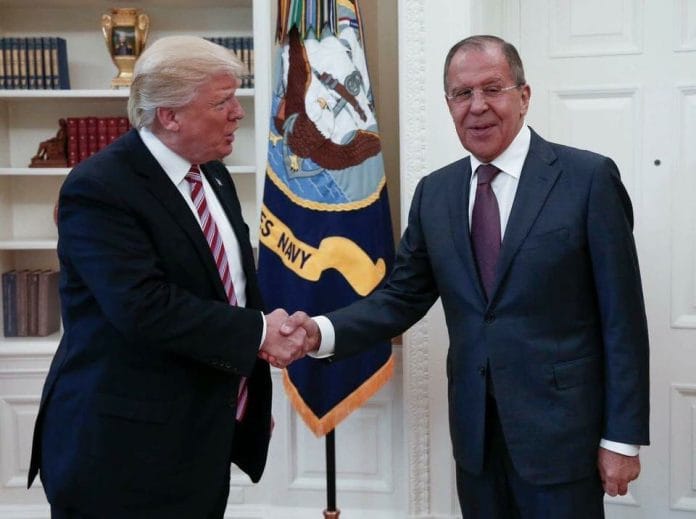TRUMP HAS NO FILTER
Did Donald Trump share classified intelligence information with Russian Foreign Minister Sergey Lavrov last week? Two officials who were in the meeting say he did. The information was about a planned ISIS operation, the officials told The Washington Post. Trump’s critics called it “dangerous”, “reckless”, and “very, very troubling” if true.
One source said that Trump’s act of disclosing what he described as “top secret” was “spontaneous”. The officials immediately called the CIA and the National Security Agency and informed them about it. This comes days after Trump fired the head of FBI who was probing allegations of Russian interference in the American presidential election campaign last year. Trump can technically disclose classified information at will, but he has to consult the ally who provided that intelligence. One official said Trump has “no filter”. The Trump administration described the story as false.
SYRIA’S SECRET CREMATORIUM
The Syrian government has constructed a secret crematorium at a military prison to dispose of the remains of thousands of murdered prisoners, the US says. The U.S. State Department has released satellite images of the facility which it said was used to hide evidence. Credible sources have believed that many of the bodies have been disposed in mass graves,” Acting Assistant Secretary in the U.S. for Near Eastern Affairs, Stuart Jones, told reporters. In February, Amnesty International had reported torture and mass hangings every week at the jail outside Damascus between 2011 and 2015. The report said that executions had been authorised at the highest levels of government and that tens of thousands of people have been imprisoned during Syria’s six-year-old civil war. Syria has not responded to the latest claims but it has in the past strongly denied any abuse at the jail.
CHINA’S VERSION OF THE MARSHALL PLAN
There is nothing democratic or transparent about the Chinese Belt Road initiative, said an editorial in The Washington Post. It has been called China’s version of the Marshall Plan, a $1 trillion drive to build infrastructure from Central Europe to Southeast Asia to South Asia and Africa. But “those who worry about a Chinese juggernaut, however, may be comforted by the fact that the top-down, autocratic nature of the belt and road plan and China’s self-interested structuring of the projects mean that it is likely to fall short of its aims”, said the paper. The initiative will “help Chinese steel and cement firms struggling with overcapacity”. American and European envoys spent their time at the summit lobbying for open procurement processes — something that could lower costs and corruption, if Beijing allows it.
MACRON JUST RESCUED MERKEL
When the new French President Emmanuel Macron met Germany’s Angela Merkel, many said France needs Merkel to revive its economy. “For years now, German officials have been accustomed to seeing France as the sick man of Europe,” said The Guardian. But things are different now. “By defeating Marine Le Pen, when Brexit and President Trump have sowed so much doubt about the fabric of today’s liberal democracy, Macron has not just salvaged one country’s reputation, he’s prevented Merkel from going down in history as the German chancellor who presided over the EU’s unravelling. His astonishing rise has all but saved Angela Merkel. It’s even pulled her, and the rest of the continent, away from the brink of political disaster: a massive far-Right surge was averted. Behind the warm embrace lay serious intent: two leaders with a continent’s future at stake.”
GOOGLIFICATION OF THE AMERICAN CLASSROOM
A profound shift is taking place in American education. It is called the Googlification of the classroom. Upending the traditional sales methods, Google has successfully managed to place their products in thousands of classrooms. It has enlisted teachers and administrators to promote Google’s products. It has directly reached out to educators to test its products — effectively bypassing senior district officials. And it has overtaken Apple and Microsoft with a powerful combination of low-cost laptops and free classroom apps. More than half the primary- and secondary-school students in the U.S. use Google education apps like Gmail and Docs. And Chromebooks are now a powerhouse in America’s schools. It is also enacting a philosophical change in public education — prioritising training children in skills like teamwork and problem-solving while de-emphasising the teaching of traditional academic knowledge, like math formulas.
Picture of Trump with Lavrov, courtesy Russian Embassy, Washington






